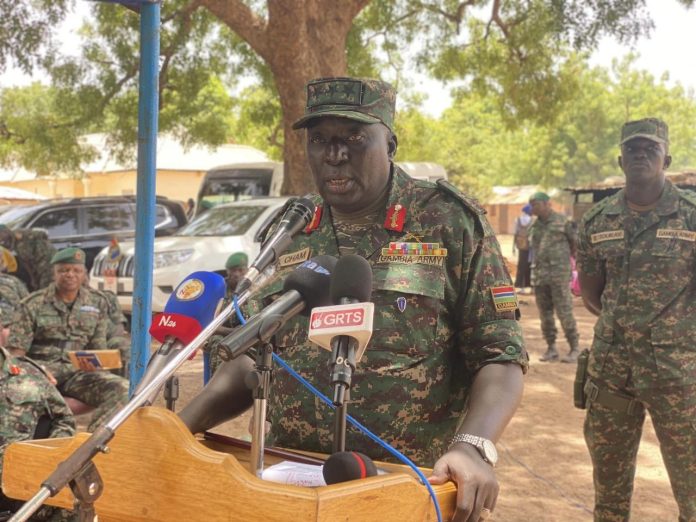A Gambian activist has issued a stark warning against the country’s emerging security doctrine after the Chief of Defence Staff confirmed that the Gambian Armed Forces have been ordered to “shoot and kill” suspected armed robbers in border communities. The activist’s open letter calls on the President, military leadership, and lawmakers to revoke the directive immediately, cautioning that such policies threaten the rule of law and risk a dangerous slide back into extrajudicial violence.
Lieutenant General Mamat O. Cham, the country’s Chief of Defence Staff, recently publicly stated that under orders from President Adama Barrow, soldiers were instructed not to negotiate with suspected criminals but to use lethal force decisively. “Your order is to shoot and kill,” Lt. Gen. Cham said, referring to violent armed robbery suspects.
This declaration has raised a debate among human rights advocates, legal experts, and civil society, some of whom view the directive as unconstitutional and a serious breach of due process protections guaranteed under Gambian law. Bubacarr Komma, a prominent human rights advocate, addressed these concerns in an open letter dated May 16, 2025, which was sent to Lt. Gen. Cham and copied to President Barrow, members of the National Assembly, the Minister of Defence, the National Human Rights Commission, and media organizations.
The letter condemned the “shoot-to-kill” order as “state-sanctioned execution” and warned it undermines the foundations of The Gambia’s democratic republic, where the use of lethal force must be governed by law and respect for human rights. “No President, no General, no Commander-in-Chief has the lawful authority to issue shoot-to-kill orders outside the bounds of due process and human rights,” Mr. Komma wrote.
The activist acknowledged the genuine security challenges faced by communities near The Gambia’s borders, where armed robbery has become a persistent threat, creating fear and instability. However, he stressed that responding with summary executions not only violates legal norms but risks a return to the dark periods of Gambian history characterized by unchecked military power and impunity.
Mr. Komma cited two recent tragic examples that illustrate the dangers of a militarized and aggressive approach to security enforcement. In March 2016, a young unarmed woman was killed by Joint-Officers after a taxi failed to stop at a checkpoint in Manjai Kunda. The officers used lethal force unnecessarily when less harmful methods, such as shooting at the vehicle’s tires or a safer interception strategy, could have prevented loss of life. No justice has been served in that case. Similarly, in August 2024, two boys crossing a poorly marked checkpoint near the Senegambia area were shot at without warning; one suffered serious injuries. These incidents highlight a pattern of excessive use of force by security personnel operating with insufficient training, accountability, or restraint.
The open letter demanded immediate action to reverse the policy. It called on President Barrow to rescind the shoot-to-kill directive and publicly reaffirm the constitutional limits on military power and the sanctity of life. It urged the National Assembly to summon the President and Chief of Defence Staff to provide a legal explanation for the order and to consider the human rights implications. It also called on the National Human Rights Commission to investigate use-of-force protocols and any resulting deaths or injuries connected to military actions.
Civil society and the press were encouraged to remain vigilant and fearless in holding authorities accountable, emphasizing that the fight against crime must never come at the expense of justice and fundamental freedoms.
The controversy over the shoot-to-kill order emerges amid mounting concerns about crime in border regions, which have seen a rise in armed robberies and violent attacks. The government faces pressure to secure these vulnerable areas but must balance security measures with the need to uphold human rights and the rule of law. The Gambian constitution and international legal obligations prohibit extrajudicial killings and require law enforcement to exercise restraint and due process in the use of force.
An observer warn that embracing a security doctrine based on summary executions risks eroding public trust in the military and government institutions and could destabilize a country still consolidating its democratic gains after decades of authoritarian rule.
As the debate intensifies, The Gambia stands at a crossroads. The challenge is to strengthen security and protect citizens without compromising the very freedoms and legal principles that underpin the nation’s democracy.



















